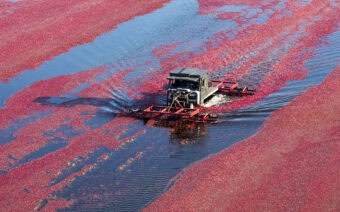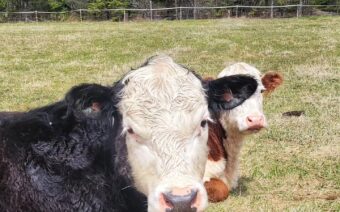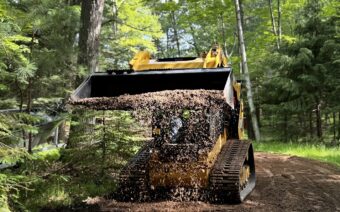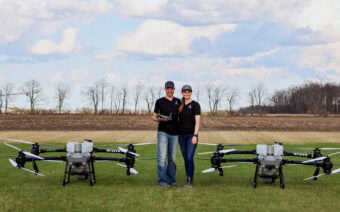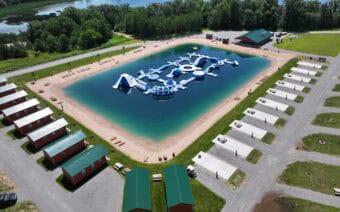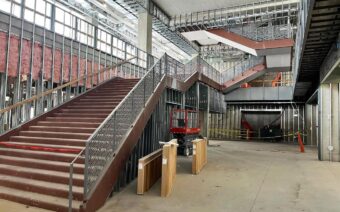
November 11, 2024
WAUSAU – The State of Wisconsin is known for many things – cheese, beer, cranberries, bratwursts, Friday fish fries and the Green Bay Packers.
A lesser known claim to fame for the Badger State, however, is its title of Ginseng Capital of the World – as it grows 90-95% of the ginseng produced in the U.S.
Furthermore, Marathon County is the top ginseng-growing county in the state, producing about 95% of Wisconsin’s annual crop.
For the past 50 years, family owned and operated Hsu’s Ginseng Enterprises, Inc. – located in the heart of Marathon County – has contributed to that crop.
Company President Will Hsu said his father, Paul – the first of 14 kids to go to college and relocate to the United States, earning a master’s degree in social work from the University of Denver – first planted ginseng in 1974 after getting the thumbs-up from his parents.
While working as a social worker in Wisconsin, Will said his father – who was born in a small fishing village in the Pescadores Islands off the coast of Taiwan – heard about ginseng from a colleague.
“He wrote to the Wisconsin Department of Agriculture (Trade and Consumer Protection) and asked for some names of ginseng farmers in the state,” Will said.
From there, Will said his father’s curiosity had him knocking on doors – eventually buying some ginseng from a farmer and sending it home to his parents.
“My dad – the 10th of 14 kids – sent those two pounds of ginseng home to his mom (who was dealing with some health issues),” he said. “His dad, my grandfather, wrote a letter back to him nine months later saying the ginseng worked (in alleviating some of his mom’s health issues). So he started believing in the product and its health benefits.”

Will said when his father returned to Taiwan for a visit a few years later and saw the effect the Wisconsin ginseng had on his mother, he decided to return to the Badger State and begin growing ginseng.
“So, that’s how Hsu’s Ginseng started,” he said. “The whole thing was really just sending some ginseng home to his mom – which is a tradition that a lot of Chinese people still do to this day, they send ginseng home to their friends, family members and loved ones trying to help them improve their health and live longer, better, healthier lives.”
When his father returned to the U.S., Will said he moved from where he was working as a social worker in Fond du Lac to Wausau – in the heart of the Ginseng Capital of the World, and that’s how Hsu’s Ginseng started.
Though growing up on the farm and in the family business, Will said after high school, he left Central Wisconsin to attend college at the University of Wisconsin-Madison where he obtained a bachelor’s degree in East Asian studies and Chinese language and literature.
From there, he earned an MBA from Harvard Business School.
After college, Will said he did his own thing – eventually working for General Mills in Minneapolis – never planning on taking over his father’s ginseng farm.
“I moved back in 2012 when my dad was diagnosed with prostate cancer and have gradually taken over the business since then,” he said. “I was gone for about 18 years.”
Unique climate, soil, topography
Farmers choosing Wisconsin, more specifically Marathon County, for its ginseng production, Will said, wasn’t accidental.
He said the region’s climate, soil and topography create ideal conditions for growing the root crop.
“The first well-known ginseng farmers who are accredited with kind of establishing the industry in Central Wisconsin were the Fromm brothers,” he said. “They started in Hamburg, and that kind of kept the industry centralized here in Central Wisconsin. That’s why many farmers to this day are still in Marathon County.”
Due to those ideal conditions, Will said Wisconsin ginseng also takes on a distinct flavor, aroma and potency.
“That can’t be replicated in other parts of the state or other growing regions,” he said. “Ginseng is grown commercially in other parts of the country, in Canada, in China and other places – but the taste and the flavor of that ginseng grown outside of Wisconsin is not the same.”
Will said there is a certain minerality in Wisconsin’s soil because of the glacial till.
“Glaciers pushed all that soil south, and when they receded, they deposited that in Central Wisconsin,” he said.
Ginseng, Will said, is similar to wine.
“Cabernet Sauvignon tastes different from Napa Valley versus other growing regions, even though the grapes themselves are clones,” he said. “Though the grapes are Napa clones, that profile can’t be replicated if those grapes are grown elsewhere. Ginseng is very similar because it grows in the soil and picks up the taste and the flavor profile of the soil.”

Furthermore, Will said the soil profile characteristics of Marathon County can’t be replicated in other growing regions.
“It adds an earthy, bitter kind of medicinal flavor to the product – and I say medicinal from an American palate, but that is a flavor profile that Chinese consumers seek with ginseng,” he said.
Will said though Wisconsin ginseng has an international presence – “if you talk to Chinese consumers, they know Wisconsin grows ginseng” – many Wisconsinites don’t realize it’s grown in their backyard.”
Only once
Will said luckily, Marathon County is the largest land county amongst Wisconsin’s 72 counties.
“There’s plenty of land,” he said.
That’s important, Will said, because ginseng can only be grown on a plot of land once due to replant disease, which is caused by soil-borne diseases.
“You can grow anything else on the land after ginseng has been grown on it – it doesn’t impact other crops, just ginseng,” he said.
As one might think, Will said he’s often asked – will you eventually run out of land?
“If you asked my dad that question 50 years ago, he would have said, ‘that’s a problem for the future,’” he said.
However, Will said to put things into perspective – the entire ginseng industry in Wisconsin today “consists of fewer than 1,500 acres.”
“There are some (other types of) farmers in Wisconsin who, individually or as a farm company, own more than 1,500 acres themselves,” he said. “So, when you think about how much land we’re actually farming in Wisconsin and at how many acres of farmland there is in Wisconsin, 1,500 acres is not a lot.”
To continue its ginseng operations, Will said Hsu’s Ginseng looks to other farmers in the county to support its efforts.
“We buy a lot of land from farmers who are no longer farming,” he said. “The number of family farms that we continue to see and work with – the next generation isn’t always farming. So a lot of the farms that we’ve bought in the last few years have been from a family that no longer farms.”
Will said Hsu’s Ginseng also rents and swaps land with local farmers.
Today, he said ginseng farmers’ biggest competitor for land is real estate developers.
“Everybody wants to live in a nice house out in the country and they want five acres of land,” he said. “So, a lot of the agricultural land is now being converted to residential use.”
Will said there has been research done, and there continues to be research done – especially in Canada – on how to reuse the land a second time for ginseng production.
“It requires fumigation,” he said. “It requires solarization to kill off the toxins that stay in the soil. I think between some technology changes and applications, we’ll find a way to be able to reuse land if we really need to.”
Plant and wait
Since ginseng production started in Wisconsin, Will said things have changed.
“In the past, consumers used to consume primarily the whole root,” he said. “They would take the whole root to a Chinese pharmacy or herbalist and have them slice it so they could use it.”
Will said customers today just want to purchase it sliced.
“Consumer demand has changed where they want more convenient, immediate uses of ginseng,” he said.
Will said that is why Hsu’s Ginseng now grows a five-year root.
“That process to grow a five-year root is very time intensive,” he said. “You have to plant the seed in virgin ginseng soil in the summer – we call that year one. Those seeds were harvested the prior year.”
As an example, Will said seeds harvested in 2023 were planted in 2024.
“After stratifying them and over-wintering them, those seeds don’t actually emerge as plants until the spring of 2025,” he said. “Then it’ll be a total of five years from then – so you’re looking at 2029 – for us to then eventually harvest that crop.”

Other aspects of the growing process, Will said, include installing posts and shade covers – or what many may refer to as tarps.
“The black shade cloth is used to simulate the forest shade and the forest setting because this is a native woodland plant,” he said. “If it doesn’t have enough shade, or has more than an hour of direct sunlight a day, it will typically die or burn off.”
Every fall, Will said the shade cloths are rolled up because they aren’t able to support snow.
“Then every spring, we’ll stretch the shade cloth back over the garden to protect the plant from the sun,” he said. “We’ll do that for a total of five cycles until the plant reaches maturity.”
All ginseng gardens, Will said, are weeded by hand.
“Farming technology hasn’t changed much – it is still a very traditional product, and it’s still grown in a traditional way,” he said. “There’s no GMO, there’s no biotech on our seeds. There have been some improvements in chemicals and fungicides, but in terms of the actual farming side, we’re still using a lot of technology that was developed when I was a kid. We’re still using a lot of the same equipment.”
The seeds that are harvested during a ginseng plant’s third, fourth or fifth year of growth, Will said, are also harvested by hand.
“This is a very labor-intensive process,” he said. “It requires a lot of care and tending.”
The intensity of the work, combined with the fact that ginseng can never be grown on the same land twice, Will said, makes it a difficult plant to grow for a lot of farmers.
“That’s why there’s so few of us left farming this crop,” he said.
When he was a kid, Will said there were more than 1,000 farmers in Wisconsin growing ginseng.
“When I came back to the company 13 years or so ago, there were probably more than 200 of us,” he said. “Today, there are probably fewer than 90 of us left in Wisconsin.”
The decline in Wisconsin ginseng farmers, Will said, is similar to the decline in dairy farmers in the state over the last several decades.
“You used to have a number of small farms, and everyone had a quarter acre, a half acre or an acre of ginseng,” he said. “With consolidation and just a decrease in the number of people farming, there are far fewer farmers doing ginseng than there were in the past.”
Much of the change that has occurred in the industry over the years, Will said, has come in the sales and retail side.
“Obviously, technology has dramatically changed, but so has the customer,” he said. “And then there are more Chinese immigrants here in the U.S. There is a better understanding of Asian culture and Asian food. It’s penetrated more of America now in 2024 than it was when my dad started the business in 1974.”
Will said ginseng is a core herb used in traditional Chinese medicine.
“Traditional Chinese medicine has been used for thousands of years and continues to be used today,” he said. “People have just a better appreciation of different cultures, different cuisines and different healthcare practices.”
An export product
The ginseng industry in the United States, Will said, was built on trade.
“This is an export product,” he said. “It is a product that isn’t primarily consumed here in the United States. Our entire industry has been built on trade with a long history going back to the 1700s and the colonial era with France and Britain trading it with China.”
Will said those in the ginseng industry “can’t make money without access to Asia.”
“At first, it was countries like Hong Kong and Taiwan, and then eventually – in the last 20 to 30 years – mainland China,” he said.
In the last five or six years, Will said the trade war has impacted the industry in the U.S.
“The desire to pull back on the global level, in terms of our international relationships, makes our job as ginseng farmers harder,” he said. “As farmers, it doesn’t matter what industry you’re in, for the most part, if you’re growing cash crops at scale, the U.S. doesn’t consume all of the products that we grow as farmers and produce – we feed the world. And we need access to those international markets in order to continue to do so.”
Growing up in a time when expansionism and the desire to trade with other countries – “to help other countries open up economically via trade” – Will said things have definitely changed in the last few years.
“I think (the changes in thought and policy) make our jobs nowadays as farmers, I think, a lot harder,” he said.
Looking to the future of Hsu’s Ginseng, Will said part of his job consists of preparing his employees for a possible shift in the industry.
“These have been family farms and family businesses involved in the industry, and that may not be the case in the future,” he said. “We have to think about what that means to us as farmers and as an industry, because the economics of growing and trading ginseng have changed. So I’m trying to prepare our staff for the fact that it may not be someone with my last name growing this crop in the future.”
That, Will said, or Hsu’s Ginseng will have to change its business model.

“We will have to change our way of doing business if we aren’t able to gain access to China – which is our primary consumer,” he said. “There’s not enough consumers elsewhere in the world to consume the ginseng we produce if we don’t have access to China.”
If China isn’t an option for Hsu’s Ginseng, Will said the company would need to find other markets, produce less or work with companies in China that are able to produce and manufacture it.
Carrying on a family, industry legacy
As Hsu’s Ginseng celebrates 50 years in business, Will said being able to carry on the legacy that his father spent his life creating “speaks to the importance of agriculture in Wisconsin in general.”
“So many of the farm families that are here in Wisconsin are multi-generational,” he said. “We’re just in the second generation, but I know family farms that are in their fifth, sixth and seventh generation.”
Ginseng, in particular, Will said, is a crop that one typically doesn’t get into unless someone shows them how to grow it.
“You can’t learn this easily without either growing up with it or having a current farmer show you how to farm it and how to produce it,” he said. “So taking Hsu’s Ginseng over, especially given the longevity of our company and the loyalty of our employees – we have some who have spent their entire careers if not 25, 30, 35 years with us – is very important to me.”
The longevity of the company and its employees, Will said, is a testament to what agriculture is about, especially in Wisconsin.
“Agriculture is about relationships,” he said. “It’s about loyalty, it’s about hard work and work ethic – and those are all things that our company stands for and that our industry stands for.”
Furthermore, Will said taking over Hsu’s Ginseng not only afforded him the opportunity to carry on his parents’ legacy but also the legacy of the Wisconsin ginseng industry.
“Everyone, I think, who grew up in Marathon County in the last 30, 40 or 50 years has some experience with or a story to tell about ginseng,” he said. “You either helped your family do it or the neighbor’s family do it, you saw the fields or you were impacted by it in some way. If you lived in Wausau, in Edgar or some of the surrounding agriculture communities – you just couldn’t get away from it.”
 Stevens Point business continues to evolve with changes
Stevens Point business continues to evolve with changes Getting students excited about manufacturing
Getting students excited about manufacturing


